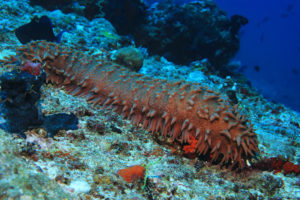A startling report from researchers in Washington indicates that the increasingly acidic waters of the United States Pacific Northwest are turning sea cucumbers into sea pickles.
The paper by Dill et al, published April 1, 2019, describes the salty, acidic brine in which the sea cucumbers have found themselves marinating. As the pH of the water decreases due to increased carbon dioxide, anaerobic fermentation slowly turns various species of Holothurians into a crunchy, sour snack, which researchers describe as “a bit much on its own but delightful on a sandwich with mayonnaise.” They also described isolated incidents in which several species of sharks appeared to be using the sea pickles to flavor tuna before eating it.
The research team stated that while this trend is likely tragic for marine ecosystems, it offers an exciting new frontier for the chicken salad industry.
Okay, you got us. April Fools! Sea cucumbers aren’t being pickled; sea pickles are a completely different organism. The pH of the ocean is approximately 8.1, far from the pH 2-3 of the various vinegars often used for pickling.
Ocean acidification, while not currently preserving echinoderms, is still a growing problem for marine ecosystems. Interestingly, it’s a separate problem from anthropogenic climate change – it’s global warming’s “evil twin.” Up to 27% of the greenhouse gases released from burning fossil fuels have been dissolved in seawater, reducing the average pH of earth’s oceans from 8.2 to 8.1 in the last 100 years. In fact, the ocean is currently more acidic than it is ever estimated to have been.
No cucumbers are being pickled by the sea, but the plummeting pH contributes to coral bleaching and a drop in coral productivity, metabolism and immune responses. Ocean chemistry is normally buffered by a variety of mechanisms, but human industrialization has accelerated the acidification beyond what the buffer mechanisms can handle. Given that species will struggle to adapt and evolve in such a short time, ocean acidification could represent a catastrophe for sea life.
In short, without major changes to our ever-growing carbon footprint, human production of greenhouse gases is on course for disaster through both the air and the sea.
On that “uplifting” note, Happy April Fools Day!


Nice article!
I learned and understood that sea cucumbers have many benefits for humans. Did you know that sea cucumbers are also very effective as the main ingredient in skincare lotion to treat and care for our skin?
check this: http://fst.unair.ac.id/en/mahasiswa-unair-production-losion-perawatan-kulit-dari-ek Extract-teripang-dan-pisang/
thank you for sharing!
Umm, Sea Pickles and Sea Cucumbers are two different organisms… They can’t interchange…